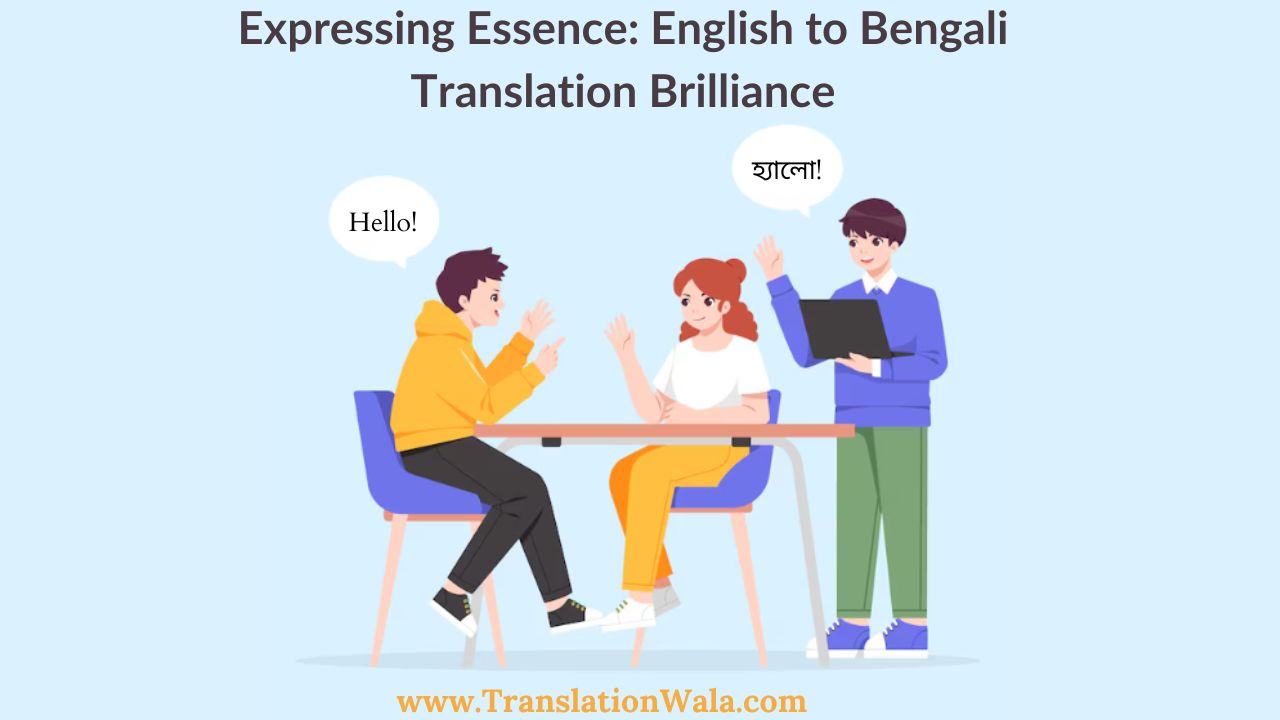Bengali has a deep sense of meaning that can be fascinating, thanks to its long literary history and beautiful melodies. That being said, people who don’t know Bengali need a bridge—a translation—to get to this great trove of stories, songs, and ideas. The art of English to Bengali Translation is very complex and involves more than just switching words around. For a Bengali audience, it’s about getting to the heart of the original work and showing it again.
Language translation from English to Bengali is brilliant because it can handle a few important problems:
- Nuance and Emotion: There are different ways to show feelings and make culture connections in English and Bengali. A good translator can pick up on the subtleties of the original text and find words and phrases that work in Bengali that will connect with the audience. One example is that translating comedy can be very hard. A lot of jokes use cultural references, humor, and puns that might not be easy to translate into Bengali. A good translation could change the joke’s words or use a Bengali term that makes you laugh in the same way.
- Literary Devices and Style: Figurative words, metaphors, and symbols are very important in literature. A great translator not only knows how to use these devices, but also knows how to translate them into Bengali in a way that keeps the same effect. For example, when translating Rabindranath Tagore’s poems, it’s important to keep the music and images that are so important to his work. It’s possible that the translator will need to look for Bengali words that have the same flow and meanings that make sense in Bengali culture.
- Register and Tone: The amount of seriousness and the audience have a big effect on the translation. It’s not the same to translate a research paper as it is to translate a children’s book. A good translation knows how to change the range of the source text to a Bengali style that sounds normal to the audience.
The Masters of the Craft:
Over the course of history, Bengal has produced many great writers who have made English and Bengali writing more accessible.
- Rajshekhar Basu: Basu was one of the first people to translate English works into Bengali. He is known for bringing Bengali fans to the works of Shakespeare, Dickens, and Tagore. His versions are known for staying true to the source text while still being easy for Bengali speakers to understand.
- Sukumar Ray: Ray was famous for being a great writer, but he was also great at translating. His readings of Lewis Carroll’s Alice’s Adventures in Wonderland showed how he could use language in a fun way and make a Bengali version of Wonderland that young readers would enjoy.
- Lila Majumdar: Majumdar translated a lot of books, and the works of Dostoevsky, Tolstoy, and Premchand were read by Bengali fans. People know her versions for how deep they are and how well they catch the emotional power of the originals.
Also Read: From Words to Meaning: Expert English to Kannada Translation
The Impact of Translation:
The English to Bengali Translation has been very important in creating Bengali writing and intellectual debate. It has given people new thoughts, different points of view, and a better understanding of Bengali culture.
- Exposure to World Literature: Bengali readers can now access a huge range of world literature through translations, from old European books to new American writing. This has helped them understand the world better and has had an effect on the growth of Bengali writing.
- Fostering Cultural Exchange: Cultures can talk to each other through translation. Translations have helped people from different cultures understand and share ideas by bringing English writing to Bengali users. People who read these books learn about other people’s ideals, views, and ways of life.
- Enriching Bengali Language: The act of translating has made the Bengali language better. To get the meaning of the source text across, translators have often had to come up with new words or change the meaning of old ones. This has caused the Bengali language to grow in words and expressiveness.
The Future of English to Bengali Translation:
Translation from English to Bengali has a bright future ahead of it. There is a greater need for high-quality translators as digital tools and online venues grow. Here are a few interesting ideas:
- Machine Translation and Human Expertise: The more advanced machine translation tools get, the faster and easier it is to translate big amounts of text. But human knowledge is still needed to get to the heart of a book. Machine translators may work together in the future to save time, while human translators will be used for quality check and more complex language.
- Focus on Diverse Voices: It’s important to copy works from a bigger range of authors and subjects as the literature world changes. This means that Bengali readers will be able to read a wider range of English works.
- Preserving Cultural Context: As the world becomes more connected, texts need to take cultural background into account. There may be times when translators need to add extra notes or comments to help Bengali users understand English-only terms or ideas.
In conclusion:
English to Bengali Translation is an art that needs both skill and imagination. Sharing countries and learning new things are both parts of the trip.
